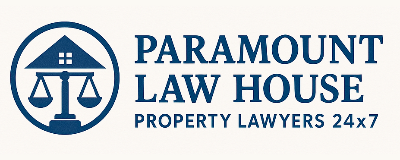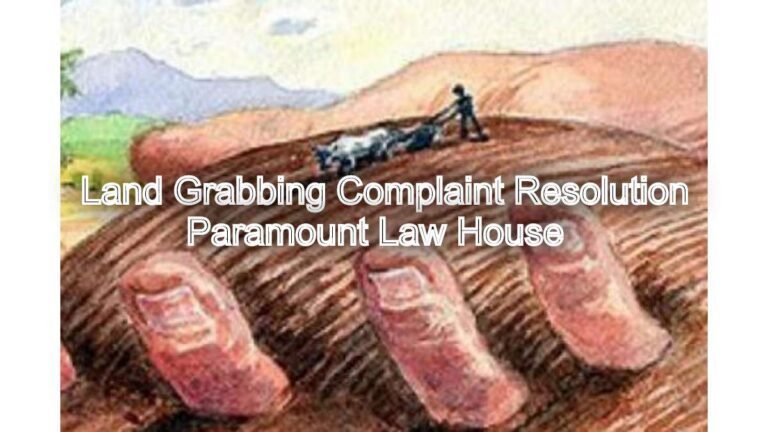Settlement of Self-acquired Property: Legal Solutions
Settlement of Self-acquired Property – Property disputes often create stress in families. When it comes to self-acquired property, the law offers clear…
Settlement of Self-acquired Property – Property disputes often create stress in families. When it comes to self-acquired property, the law offers clear remedies. Yet, misunderstandings and conflicts still arise. Many people are unaware of their rights. Others struggle with documentation and legal procedures. That is why timely legal support is essential. At Paramount Law House: Property Lawyers 24×7, we focus on guiding clients through these sensitive issues with precision and care.
Settlement of Self-acquired Property: Legal Solutions: Paramount Law House
Understanding Self-acquired Property
Self-acquired property means assets purchased or acquired by an individual through personal effort, income, or lawful transfer. It is not ancestral in nature. Therefore, the owner has full rights to use, sell, gift, or bequeath it. Unlike joint family property, no one else can claim ownership during the lifetime of the purchaser.
However, disputes arise when succession begins after the owner’s death. Questions regarding wills, intestate succession, and rights of heirs often lead to conflicts. Moreover, family members sometimes contest transactions made by the owner during their lifetime.
Legal Ownership Rights
The owner of self-acquired property enjoys absolute ownership. They may dispose of the property in any manner they choose. They may create a settlement deed. They may gift the property. They may register a will. They may even transfer it through sale. The law recognizes their right to deal with the property freely.
Still, issues arise when heirs or relatives question the validity of such decisions. For example, if a will appears forged, the matter goes to court. Similarly, if a gift deed is challenged, litigation follows. In such situations, experienced property lawyers play a vital role.
Importance of Documentation
Documentation is the backbone of property settlement. Without proper documents, legal claims become weak. Ownership records, title deeds, encumbrance certificates, and registered agreements provide strong evidence. If the owner settles the property through a registered deed, the transfer gains legal validity.
Furthermore, courts always give priority to written and registered documents. Oral arrangements rarely hold value. Therefore, proper drafting, registration, and record maintenance are crucial for avoiding disputes. At Paramount Law House: Property Lawyers 24×7, we emphasize accurate documentation for every client.
Settlement Deeds
A settlement deed is a common legal solution. It is executed by the property owner to distribute assets during their lifetime. Unlike a will, it takes effect immediately after registration. It is irrevocable once executed. It reduces the chance of future disputes among heirs.
For example, parents may choose to settle property in favor of children. A registered settlement deed ensures that no one can later challenge the arrangement. It provides peace of mind for both the owner and the beneficiaries.
Gift Deeds
Another solution is a gift deed. A gift deed allows the transfer of property without consideration. It must be executed voluntarily. It must also be accepted by the recipient during the lifetime of the donor. Registration of a gift deed is mandatory.
Although it is similar to a settlement deed, a gift deed usually covers transfers made out of love and affection. Once registered, it cannot be revoked unless both parties agree. This legal tool ensures clarity in property transfer.
Wills and Testamentary Transfers
A will is an important instrument for self-acquired property. It allows the owner to distribute assets according to personal wishes after death. The will takes effect only upon the demise of the testator. Until then, it may be changed or revoked at any time.
Probate of a will is required in certain cases. Probate is the process by which a court validates the will. Once probated, the document becomes conclusive proof of ownership transfer. However, wills often face disputes. Allegations of undue influence, coercion, or forgery are common. Proper drafting and attestation reduce such risks.
Intestate Succession
If no will exists, intestate succession applies. The law of succession depends on the religion of the deceased. For Hindus, the Hindu Succession Act governs the process. For Muslims, personal law principles apply. For Christians and others, the Indian Succession Act provides guidelines.
In such cases, heirs inherit the property in equal proportion as per law. Disputes usually arise when one heir occupies the property exclusively. Partition suits often become necessary. Mediation sometimes resolves the conflict. But when mediation fails, courts decide the division.
Partition of Property
Partition is another legal method of settlement. It allows co-owners to divide property into specific shares. Partition may occur through mutual agreement or through a court decree. When done by agreement, a registered partition deed is required.
Court proceedings become necessary when heirs do not agree. The court appoints a commissioner to measure and divide the property. Each heir then receives a defined share. Though time-consuming, partition ensures legal clarity.
Litigation in Property Disputes
Despite preventive measures, property disputes often end up in litigation. Common grounds include disputes over title, allegations of forgery, or claims of undue influence. Injunction suits are filed to prevent illegal occupation or transfer. Declaratory suits confirm ownership rights. Partition suits divide property.
Courts analyze evidence, verify documents, and examine witnesses. Delay in court proceedings is common. However, with strong representation, rightful claims prevail. Paramount Law House: Property Lawyers 24×7 ensures that every client receives effective legal representation in such disputes.
Alternative Dispute Resolution
Litigation is lengthy and expensive. Therefore, alternative dispute resolution methods are encouraged. Mediation, arbitration, and conciliation offer quicker settlements. They save time, money, and family relationships.
In mediation, a neutral mediator helps parties reach an agreement. Arbitration is binding and has the force of a court decree. Conciliation allows flexible negotiations under legal guidance. Many property matters are now resolved through these mechanisms.
Preventive Legal Measures
The best way to avoid disputes is prevention. Owners of self-acquired property should prepare clear documents. They should register every transfer. They should maintain updated records. They should draft wills with professional legal assistance. They should execute settlement or gift deeds with proper witnesses.
Additionally, property owners must verify that their title is free of encumbrances. They must ensure that revenue records, tax payments, and mutation entries are up to date. These measures reduce the risk of future challenges.
Role of Property Lawyers
Property lawyers are essential in resolving self-acquired property matters. They draft and register deeds. They guide in succession planning. They represent clients in partition suits and probate proceedings. They advise on preventive steps.
At Paramount Law House: Property Lawyers 24×7, our team provides round-the-clock legal support. We ensure compliance with legal requirements. We safeguard ownership rights. We work to protect our clients from unnecessary disputes.
Case-specific Legal Strategies
Every case requires a tailored strategy. For instance, if a client faces a forged will, we advise filing a declaratory suit. If siblings occupy the property illegally, we file an injunction. If heirs disagree on shares, we file a partition suit. If time is critical, we recommend mediation.
By analyzing facts and documents carefully, we provide solutions that suit the client’s needs. Our focus remains on safeguarding lawful ownership while minimizing conflict.
Challenges in Settlement
Settlement of self-acquired property faces many challenges. Emotional conflicts between heirs are common. Doubts about authenticity of documents also arise. Delays in registration offices or courts add to the problem. Some heirs may live abroad, making coordination difficult.
However, with proper legal planning and timely action, these challenges can be managed. Experienced lawyers anticipate risks and prepare strategies in advance.
Why Timely Action Matters
Delay often complicates matters. For example, if a will is not probated on time, third parties may create claims. If illegal occupation continues for long, it may give rise to adverse possession claims. If property tax records are outdated, municipal penalties may apply.
Therefore, swift legal action protects the rights of the rightful owner or heir. Timely settlement also reduces stress and preserves family harmony.
Frequently Asked Questions
Self-acquired property is any property purchased, earned, or acquired by an individual through their own income, effort, or lawful transfer. It is not ancestral. The owner has complete control and may sell, gift, will, or settle it without needing consent from legal heirs during their lifetime.
No. Legal heirs have no claim over self-acquired property while the owner is alive. The owner is the absolute authority. However, after the owner’s death, if there is no will, intestate succession applies, and heirs inherit the property as per succession laws.
There are multiple solutions. The owner may execute a settlement deed, which takes effect immediately after registration. They may prepare a gift deed, transferring property out of love and affection. They may draft a will for posthumous transfer. If there is no will, the property is distributed through intestate succession under applicable laws.
Proper documentation ensures legal validity and reduces disputes. Registered deeds, wills, and updated records provide strong proof of ownership and transfer. Courts prefer written, registered documents over oral claims. Clear documentation also prevents future challenges from heirs or third parties.
Property lawyers guide owners in drafting and registering wills, settlement deeds, or gift deeds. They represent heirs in succession disputes, probate petitions, and partition suits. Lawyers also advise on preventive legal steps, resolve conflicts through mediation, and ensure lawful transfer of ownership.
Conclusion
The settlement of self-acquired property requires clear legal planning. Owners must protect their rights through proper deeds, wills, and documentation. Heirs must resolve disputes through lawful means. Preventive steps, such as registration and succession planning, reduce conflicts.
When disputes arise, legal remedies like settlement deeds, gift deeds, wills, partition, and litigation provide solutions. Alternative dispute resolution methods further simplify the process. However, timely action and professional legal guidance remain crucial.
At Paramount Law House: Property Lawyers 24×7, we stand committed to providing effective solutions for every property matter. We ensure that self-acquired property rights remain secure. We help clients achieve peaceful settlements. We protect ownership with dedication, precision, and continuous legal support.
Read More
- Stay Order Assistance: Protect Your Property Interests
- Succession Planning Made Simple: Legal Assistance Available
- Transfer of Property to Legal Heir after Death: Expert Advice
- Rent Recovery Services: Swift and Effective Solutions
- Property Purchase Agreement Legal Services: Expert Assistance
- Law Commission of India






